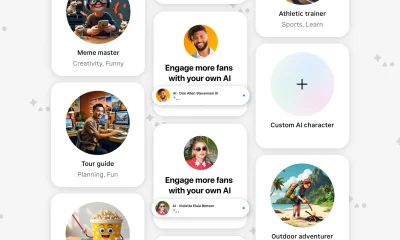Artificial Intelligence
Researcher Develops Domain-Specific Scientific Chatbot

In scientific research, collaboration and expert input are crucial, yet often challenging to obtain, especially in specialized fields. Addressing this, Kevin Yager, leader of the electronic nanomaterials group at the Center for Functional Nanomaterials (CFN), Brookhaven National Laboratory, has developed a game-changing solution: a specialized AI-powered chatbot.
This chatbot stands out from general-purpose chatbots due to its in-depth knowledge in nanomaterial science, made possible by advanced document retrieval techniques. It taps into a vast pool of scientific knowledge, making it an active participant in scientific brainstorming and ideation, unlike its more general counterparts.
Yager’s innovation harnesses the latest in AI and machine learning, tailored for the complexities of scientific domains. This AI tool transcends the traditional boundaries of collaboration, offering scientists a dynamic partner in their research endeavors.
The development of this specialized chatbot at CFN marks a significant milestone in digital transformation in science. It exemplifies the potential of AI in enhancing human intelligence and expanding the scope of scientific inquiry, heralding a new era of possibilities in research.

Kevin Yager (Jospeh Rubino/Brookhaven National Laboratory)
Embedding and Accuracy in AI
The unique strength of Kevin Yager’s specialized chatbot lies in its technical foundation, particularly the use of embedding and document-retrieval methods. This approach ensures that the AI provides not only relevant but also factual responses, a critical aspect in the realm of scientific research.
Embedding in AI is a transformative process where words and phrases are converted into numerical values, creating an “embedding vector” that quantifies the text’s meaning. This is pivotal for the chatbot’s functioning. When a query is posed, the bot’s machine learning (ML) embedding model computes its vector value. This vector then navigates a pre-computed database of text chunks from scientific publications, enabling the chatbot to pull semantically related snippets to better understand and respond to the question.
This method addresses a common challenge with AI language models: the tendency to generate plausible-sounding but inaccurate information, a phenomenon often referred to as ‘hallucinating’ data. Yager’s chatbot overcomes this by grounding its responses in scientifically verified texts. It operates like a digital librarian, adept at interpreting queries and retrieving the most relevant and factual information from a trusted corpus of documents.
The chatbot’s ability to accurately interpret and contextually apply scientific information represents a significant advancement in AI technology. By integrating a curated set of scientific publications, Yager’s AI model ensures that the chatbot’s responses are not only relevant but also deeply rooted in the actual scientific discourse. This level of precision and reliability is what sets it apart from other general-purpose AI tools, making it a valuable asset in the scientific community for research and development.

Demo of chatbot (Brookhaven National Laboratory)
Practical Applications and Future Potential
The specialized AI chatbot developed by Kevin Yager at CFN offers a range of practical applications that could significantly enhance the efficiency and depth of scientific research. Its ability to classify and organize documents, summarize publications, highlight relevant information, and quickly familiarize users with new topical areas stands to revolutionize how scientists manage and interact with information.
Yager envisions numerous roles for this AI tool. It could act as a virtual assistant, helping researchers navigate through the ever-expanding sea of scientific literature. By efficiently summarizing large documents and pointing out key information, the chatbot reduces the time and effort traditionally required for literature review. This capability is especially valuable for keeping up with the latest developments in fast-evolving fields like nanomaterial science.
Another potential application is in brainstorming and ideation. The chatbot’s ability to provide informed, context-sensitive insights can spark new ideas and approaches, potentially leading to breakthroughs in research. Its capacity to quickly process and analyze scientific texts allows it to suggest novel connections and hypotheses that might not be immediately apparent to human researchers.
Looking to the future, Yager is optimistic about the possibilities: “We never could have imagined where we are now three years ago, and I’m looking forward to where we’ll be three years from now.”
The development of this chatbot is just the beginning of a broader exploration into the integration of AI in scientific research. As these technologies continue to advance, they promise not only to augment the capabilities of human researchers but also to open up new avenues for discovery and innovation in the scientific world.
Balancing AI Innovation with Ethical Considerations
The integration of AI in scientific research necessitates a balance between technological advancement and ethical considerations. Ensuring the accuracy and reliability of AI-generated data is paramount, especially in fields where precision is crucial. Yager’s approach of basing the chatbot’s responses on verified scientific texts addresses concerns about data integrity and the potential for AI to produce inaccurate information.
Ethical discussions also revolve around AI as an augmentative tool rather than a replacement for human intelligence. AI initiatives at CFN, including this chatbot, aim to enhance the capabilities of researchers, allowing them to focus on more complex and innovative aspects of their work while AI handles routine tasks.
Data privacy and security remain critical, particularly with sensitive research data. Maintaining robust security measures and responsible data handling is essential for the integrity of scientific research involving AI.
As AI technology evolves, responsible and ethical development and deployment become crucial. Yager’s vision emphasizes not just technological advancement but also a commitment to ethical AI practices in research, ensuring these innovations benefit the field while adhering to high ethical standards.
You can find the published research here.












